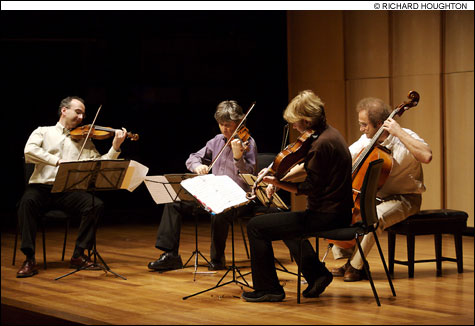
PLAYING BARTOK'S MASTERWORK: The Takács Quartet. |
One of the best string quartets in the world will be within a D-string's distance from Portland, come Monday night. The Takács Quartet, based at the University of Colorado in Boulder, will perform a diverse and riveting program at the Paul Creative Arts Center on the University of New Hampshire campus as part of the UNH Celebrity Series.The Takács Quartet have been touring and performing since 1975 and have won numerous awards, including a 2002 Grammy award for Best Chamber Music Recording for its recording of Beethoven's Three "Razumovsky" Quartets, Op.59 and "The Harp" Quartet, Op.74, which outline what are generally considered some of the most important works to come out of Beethoven's "Middle Period" of composition.
In addition to creating numerous incredible recordings (if you are a fan of string-quartet music, it is likely you have at least one of their recordings) the Takács Quartet also maintain a busy touring schedule. They perform approximately 90 concerts a year throughout Europe, Australia, Asia, and North America and, thanks to an appointment as associate artists at the South Bank Centre in London, they perform several concerts a year in London.
The concert on November 17 will include Franz Joseph Haydn's Quartet Op. 77 No. 2, a standard of the string quartet repertoire, as well as Robert Schumann's emotional and stirringly Romantic Quartet Op. 41 No. 1. The Haydn will certainly be lovely to hear performed by such talent, and to end with Schumann, who was an emotionally fragile Romantic composer who spent his life desperately seeking the light on the other side of Beethoven's shadow, will be a dramatic ending for sure. But it is the middle child of this concert that demands the listener's attention.
Standing out as a haunting reminder of the historical importance of the early 20th century, the performance of Hungarian composer Bela Bartok's String Quartet No. 2 is unquestionably the highlight of the concert. This piece is the second of six string quartets Bartok wrote during the turbulent times from 1908 to 1939. The works are considered some of the most important compositions for this popular instrument combination due to their emotional intensity as well as to the incredible diversity of sound Bartok coaxes from these four similar string instruments.
Bartok's String Quartet No. 2 was written in 1917, not long before he emigrated to America, and is clearly the composer's musical reaction to the First World War. The work explores the depth of Bartok's mourning over the death and destruction of the war. Uncomfortable and lengthy dissonances thread through the melodies even as the scalar passages drive the work ever-forward like an unrelenting march toward the inevitable end. The last movement is unmistakable in its grief; the unapologetic dissonances and scant melodies are certain to resonate with modern audiences reflecting on the current state of war around the world.
Often compared to Beethoven's famous string quartets and considered equally as important to the canon, Bartok's six quartets invoke many folk melodies. His works often infuse the Hungarian folk songs he studied in great depth as an ethnomusicologist with the movement toward atonality common to the time. Although, like any good composer, Bartok repeats his melodies throughout the works, he mimics the tradition of folk music passed from one musician to the next, by presenting the themes or melodies in slightly altered ways each time they return. This gives Bartok's music a sense of evolution; each presentation of the thematic material represents an individual life within the enormous scope of time.